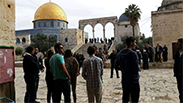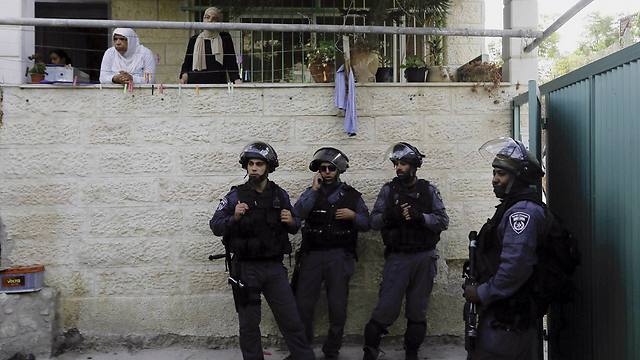
Wanted: A new strategy for Jerusalem
Op-ed: The green light given to Jewish settlement in Arab neighborhoods after Operation Protective Edge gave Hamas a unique opportunity to shake off the burden of its defeat in the Gaza conflict and instigate serious riots both in the capital and the West Bank.
The little economic rehabiliation that is taking place is being done slowly, and no one seems to be in a hurry.
Israel sees Hamas as having no status and no chance, and all it has to do is to thwart its terror operations, carry out wide-scale preventive operations in Judea and Samaria, detain as many Hamas activists as possible before they carry out their evil schemes, and punish the terrorists who do manage to execute disgusting acts of terror such as the despicable murder of five Israelis at a synagogue in Jerusalem.
There is a direct line between the end of Operation Protective Edge and the attacks in Jerusalem. Security considerations are preventing any possibility of ceding full control over Judea and Samaria: The sole rocket to reach the Ben-Gurion Airport area from Gaza halted most civil aviation to and from Israel for 36 hours, and put an end to the "peace process" for the foreseeable future.
In the absence of a "process," the Israeli government has changed its political strategy vis-a-vis Jerusalem.
Since the 1967 Six-Day War, Israel's governments have believed that out of all the key issues between Israel and the Palestinians – security and borders, refugees and Jerusalem – the refugees and Jerusalem issues are the most thorny.
Prime ministers managed to push Jerusalem to the back of the line, based on the theory that as the sides reached more and more understandings, an improved atmosphere would help inspire creative solutions – including on the future of Jerusalem.
But the battle in Gaza and the failure of negotiations brokered by US Secretary of State John Kerry led the Israeli government to reverse the order – and the last became the first. This new strategy can be seen in the green light given to the growing Jewish invasion of Jerusalem's Arab neighborhoods and the declaration that a Jew cannot be prevented from building in any place in the city.

Several weeks after the end of the Gaza operation, Jews settled in a group of houses the City of David – in the Silwan area – and the minister of Jerusalem affairs, Naftali Bennett, announced in a dramatic nighttime press conference that this was a "historic" act. Indeed, the Arab residents of Jabel Mukaber and Silwan understand the far-reaching significance of the move and how this is all supposed to end.
In the midst of the riots in Jerusalem, the same minister for Jerusalem affairs published an opinion piece in the New York Times in which he reiterated his suggestion for solving the conflict, including offering residents of Area C of the West Bank, some 70,000 people, Israeli citizenship.
The piece makes no mention of Jerusalem and its Arab citizens. Will they also become Israelis, adding hundreds of thousands more people to Israel's Arab minority? And if there is no intention of this kind, what will be the permanent status on offer to Arab Jerusalemites in a united Jerusalem?
Moving on to the flare-up around the Temple Mount, about which so much has been written. Daily life in the city has suffered increasing disruption. Repeated assaults on the Light Rail and a series of painful terror attacks at its stations and in other places has undermined the population's sense of security.
By opening the "Jerusalem file" at this moment, Israel has allowed Hamas the unique opportunity to shake off, at least temporarily, the burden of its defeat in Protective Edge. It has allowed Hamas to instigate serious disturbances both in the capital and in the West Bank, which forced the Palestinian Authority to express its solidarity with the battle for the sanctity of Islam on the Mount. It even forced Jordan and Egypt to join the pressure on Israel against the backdrop of an allegedly religious conflict.
On the broader international level, Israel has created a common rallying point from one end of the Muslim world to the other – from the Islamic State to the country's own Arab population.
The Shin Bet's success in uncovering large Hamas terror cells is commendable, but also leaves a question mark over the "mowing the lawn" policy Israel has been implementing for years. In other words, if the grass will keep growing, is this endless holding policy expected to yield more than temporary results? A battered Hamas in Gaza will not allow Israel to "forget about it" for eternity.
The prime minister insisted on defining a limited and real military goal for the operation in Gaza over the summer. The strategy adopted in Jerusalem this fall has proven to lead to a major disaster.
Netanyahu must go back and set a different strategy for Jerusalem, and define a real and declared goal for this strategy, which will be clear, comprehensible and bind all of Israel's citizens and all its leaders.
Efraim Halevy is a former head of the Mossad.










